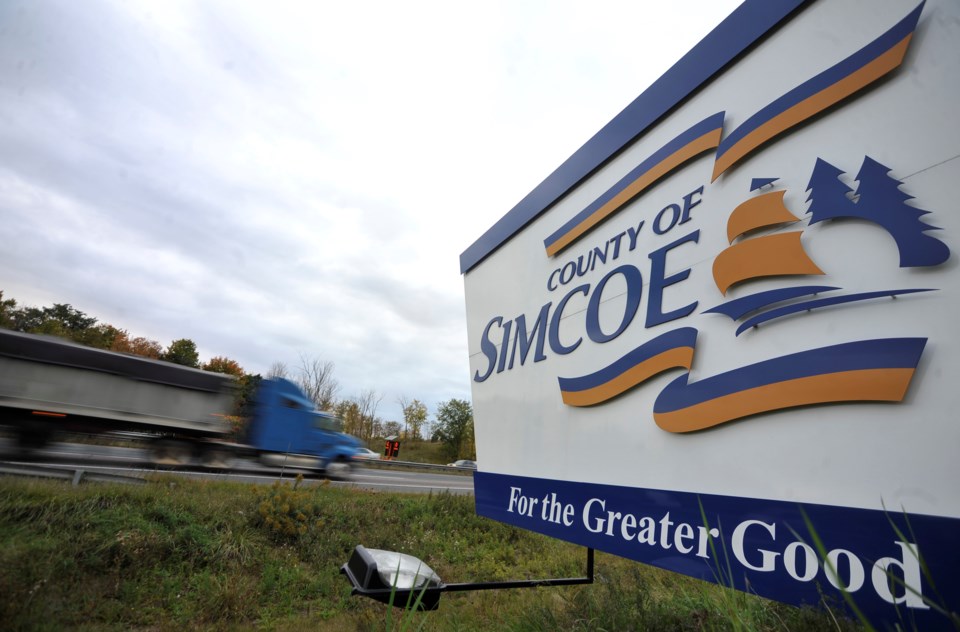Simcoe County may require residents to use their green bin as the ticket to having their garbage picked up.
In a five-year update to its Solid Waste Management Strategy, county consultants and staff are looking at ways to encourage residents to do the environmentally responsible thing – dispose of their kitchen scraps in their green bins.
And to do that, the county is not recommending forcing residents to manage their waste on a two-week cycle to boost the low participating in the organics program as Barrie did in January 2015.
Moving in that direction could result in garbage not being collected for a month in the winter, as the county will cancel collection during severe weather and allow for doubling up the next week, noted Rob McCullough, the county’s solid waste management supervisor.
Instead, county staff will examine the costs of providing 80-litre bins for county households and adding pet waste to its organics program.
“Your recycling program is second to none. It performs really well. The one area of significant improvement is in the green bin program, which frankly lags behind,” HDR’s Janine Ralph told county politicians Tuesday morning.
“The predominant way of increasing that is to encourage people to move their organics out of their garbage and into their green bins. The county’s 80-litre container rule should be enforced. Many residents d not put out one 80-litre container. Often times, they’re using 120-litre containers.”
Not enforcing its rule, therefore, is enabling residents to put out 50 percent more garbage, which reduces the need for them to use their green bins, she explained.
She also suggested the county examine a rule that would enable contractors to skip collecting garbage from households who do not use a green bin – that is, pick up garbage only if a family puts out its green bin each week.
“There’d be a requirement for additional staff in bylaw enforcement and public education,” she said, adding the county does a good job of helping people understand what can go into the green bin but it needs to stress the importance of organics diversion.
The county could also pass a ban on allowing organics to be included in its garbage stream, but it would have to find ways to make compliance easy to see, such as using clear plastic bags, an option county councillors discussed but rejected last winter.
Just less than 40 percent of organics are disposed of in the green bin program, a county audit revealed, which is down from 47 percent in 2010.
The county is also working on a business case for an organics processing facility, which would enable the county to handle its own waste, rather than truck it to a processor in Hamilton. That contract expires in late 2018.
As part of that work, the choice of technology will impact costs as well as what could be added to the green bin program.
During open houses, the county’s consultant heard from the public pet waste and diapers should be included in the organics program.
“The (solid waste) strategy is the road map,” said Ralph. “The intent (of the waste management strategy update) is to help the county achieve its diversion targets.”
With a target of 77 percent diversion by 2031, the county has a lot of work ahead, as its diversion rate in 2015 was 60 percent. The county’s 2021 diversion goal is 71 percent – and the waste strategy update is designed to help the county achieve that.
The amount we throw away is rising, the strategy’s background research revealed.
Helping the public change its habits so is important, said McCullough.
“The amount that people are throwing away is increasing,” he said, adding the organics program is an important diversion tool, which will become more important as the county’s population continues to grow.
Willma Bureau, the county’s contracts and collections supervisor, added the county could introduce a textile program, which would enable residents to dispose of soiled, stained or ripped clothing that isn’t suitable to give to a charity.
“It’s quite astounding – the amount of textile waste,” she said. “The price of clothing has declined, so it’s become a disposable waste.”
Other options to reduce:
- reducing the curbside garbage limit from one bag weekly plus a seven additional tagged bags to one bag plus three tagged bags
- reducing the double up allowance for Victoria Day and Thanksgiving – as much of the waste could be organic
- approving a mandatory diversion bylaw, which requires a green bin to be set out for garbage to be collected
- reducing food waste through education, changing provincial rules
- introducing disposal bans
- introducing a rewards program for households who lead by example



